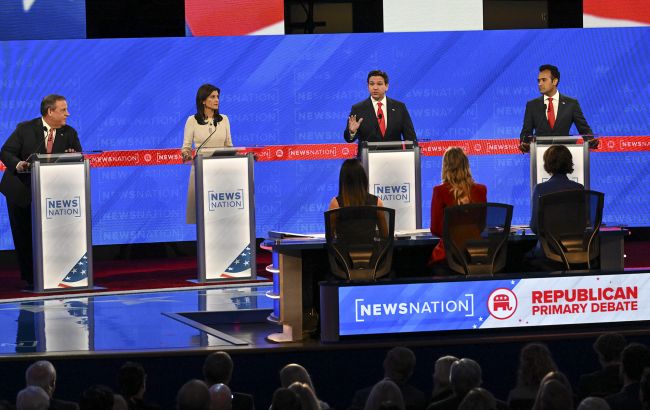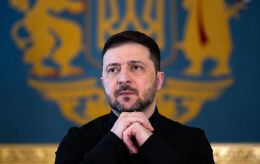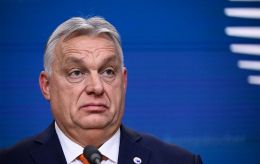GOP presidential debates: Candidates leave no stone unturned
 Photo: Republican presidential candidates leave no stone unturned in final debate (Getty Images)
Photo: Republican presidential candidates leave no stone unturned in final debate (Getty Images)
On November 6, at the year's final GOP debate in Alabama, a fiery exchange unfolded among four key Republican presidential candidates: Florida Governor Ron DeSantis, entrepreneur Vivek Ramaswamy, former New Jersey Governor Chris Christie, and ex-UN Ambassador Nikki Haley. The debate was marked by sharp clashes and significant moments, providing key insights into the dynamics of the Republican presidential race. Here's an analysis of the pivotal points from this critical fourth Republican presidential debate.
Сandidates
Ronald Dion DeSantis is an American politician, a member of the Republican Party, and an attorney who has served as the governor of Florida since 2019. DeSantis was a U.S. Representative for Florida's 6th district from 2013 to 2018. He holds degrees from Yale University and Harvard Law School and served as a JAG officer in the U.S. Navy. As Governor, DeSantis has been noted for his conservative policies. He has gained national attention for handling various state issues, including his response to the COVID-19 pandemic, environmental policies, and educational reforms.
Nimrata Nikki Haley is an American politician, diplomat, and businesswoman who served as the Governor of South Carolina from 2011 to 2017. A member of the Republican Party, Haley was the first female governor of South Carolina and the second Indian-American governor in U.S. history. Before her governorship, she served in the South Carolina House of Representatives. Haley gained further prominence on the national stage when President Donald Trump appointed her as the United States Ambassador to the United Nations, a role she held from January 2017 to December 2018. During her tenure at the U.N., Haley was known for her assertive approach to foreign policy and strong advocacy of American interests.
Vivek Ramaswamy is an American entrepreneur, author, and political figure known for criticizing corporate America's involvement in social and political issues. He earned a degree in Biology from Harvard and a law degree from Yale. Ramaswamy gained prominence in the business world as the founder of Roivant Sciences, a biopharmaceutical company, where he was involved in drug development and healthcare investment. He also wrote a book titled "Woke, Inc.: Inside Corporate America's Social Justice Scam," arguing against merging politics with business. Ramaswamy's public commentary and book have positioned him as a notable voice in discussions about the role of corporations in society and politics.
Chris Christie is an American politician and former federal prosecutor who served as the 55th Governor of New Jersey from 2010 to 2018. Christie, a member of the Republican Party, is known for his straightforward style and strong presence in the national political arena. Before his governorship, he served as the U.S. Attorney for the District of New Jersey from 2002 to 2008, where he focused on anti-corruption efforts. As Governor, Christie dealt with several key issues, including the state's budget, education reform, and Hurricane Sandy recovery efforts. His governorship, however, was marred by the "Bridgegate" scandal. Christie has been a political commentator post-governorship and briefly ran for the Republican nomination in the 2016 presidential election.
Key takeaways
The debate was marked by sharp attacks, particularly against Nikki Haley, who recently gained momentum. DeSantis criticized her for allegedly yielding to left-wing media pressure, particularly on transgender issues. At the same time, Ramaswamy labeled her as more fascist than the Biden administration, citing her views on social media verification.
DeSantis and Ramaswamy accused Haley of being influenced by Wall Street donors and lenient towards China. Ramaswamy's remarks were particularly pointed, referring to Haley as "lipstick on a Dick Cheney." Haley dismissed these accusations, suggesting her opponents were envious of her donor support. An exciting dynamic emerged as Chris Christie defended Haley against Ramaswamy's attacks, indicating a possible strategic alliance.
Nikki Haley has emerged as a significant contender against Donald Trump, primarily due to her consistently strong performances in previous debates. This momentum is reflected in national GOP primary surveys, where her support has risen from an average of around 4.5% to nearly 11%. In contrast, other candidates vying against Trump have witnessed a decline in their support, highlighting Haley's growing prominence in the race.
Christie was the exception, openly criticizing Trump as unfit for the presidency, contrasting with other candidates who avoided confrontations with Trump, indicating a cautious approach towards Trump's supporter base.
The debate showcased the candidates' differing policy beliefs and efforts to position themselves as the primary alternative to Trump.
Critical opportunity
This debate took place with the Iowa caucuses approaching, a critical point in the presidential nomination process.
The debate in Alabama was a crucial opportunity for the candidates to showcase their policies and personalities to the voters. The intense rivalry and strategic positioning reflect the high stakes of the primary race and the candidates' efforts to gain traction in a crowded field.
The candidates' performances were crucial in positioning themselves as viable alternatives to Trump, who remains a significant influence in the Republican party despite not participating in the debates.


